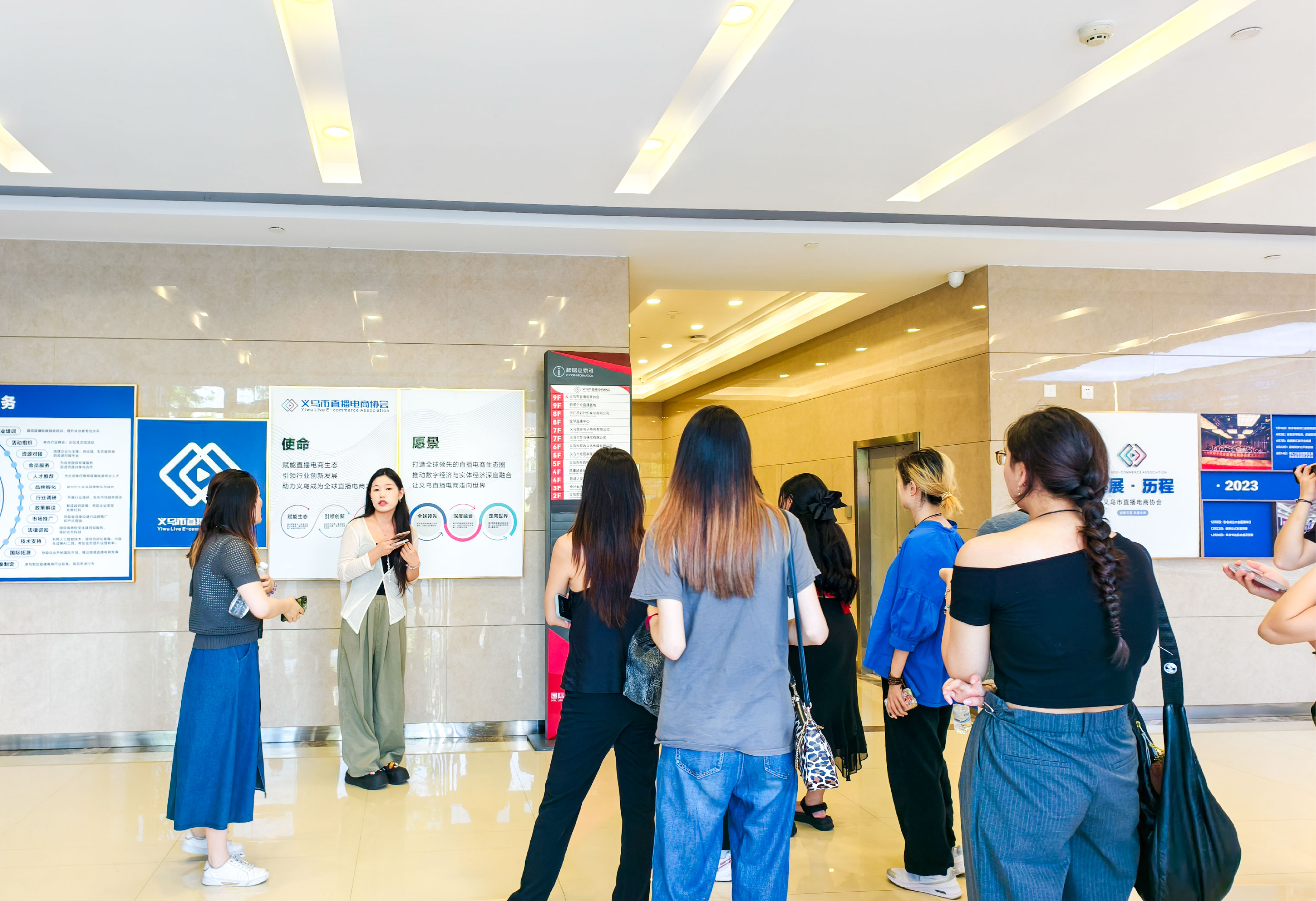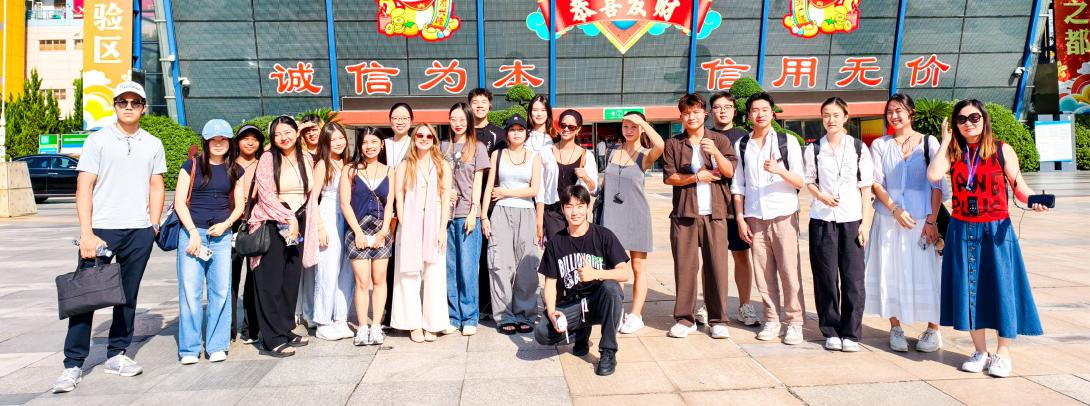Students swapped lecture halls for bustling trade halls as they traveled to Yiwu, Zhejiang Province — home to the world’s largest wholesale market. On a weekend trip led by Assistant Professor of Practice in Interactive Media Business (IMB) Nicole Wang in collaboration with the Office for Community-Engaged Learning (CEL), the group embarked on a journey into the heart of global commerce, exploring how products move from design to production to delivery.
The students navigated the market’s endless aisles, observed international buyers in action, visited local factories and e-commerce companies, and even put their negotiation skills to the test. The trip offered a rare opportunity to experience global supply chains up close — and to see how innovation, adaptability, and communication drive international trade.
“We consumers are used to shopping on online marketplaces and social media, but very little do we know how large, global, and complex the ecosystem behind it is,” Professor Wang said. “This trip allows our students to witness firsthand how innovation in supply chain, logistics, and digital creativity come together to power the online economy."
Over the years, Yiwu’s trade ecosystem has grown from a small local market into an international hub linking suppliers and buyers from across Asia, Europe, Africa, and beyond. Government data reported that last year Yiwu’s import-export trade reached more than 400 billion yuan (more than USD 56 billion). Visiting the market helped the students understand the scope of global trade going through the city.
For many students, stepping into Yiwu International Trade City — a sprawling complex of five buildings, each as big as a shopping mall — was an overwhelming experience. The market holds over 75,000 booths selling everything from toys to textiles to electronics to Christmas decorations.

“The trip to Yiwu gave me a deeper understanding of how small and medium-sized goods are sourced, manufactured, and distributed globally,” said Interactive Media and Business major Wang Hanjing ’26, who went on the trip. “It made me realize how crucial communication and negotiation are when dealing with suppliers in a global market.”
“There are so many different types of products that are beyond my imagination,” he said. “For example, there are even stores specialized in price tags and buttons!”
The market’s scale and diversity left a lasting impression on Duh Zathang ’27, a Business and Finance major. “Seeing the variety of industries that China is able to cater to — from toys to gym equipment — was eye-opening,” he said.
The trip also pulled back the curtain on the innovation going on behind the scenes, said Yang Luyi ’26, a Business and Finance major. “I was more impressed by how countless methods of sales and transactions are evolving and expanding so rapidly here,” she said. “It was eye-opening to see how Yiwu is so diverse, modern, and international as a county-level city in China.”
For students with plans to build their own startups, visiting the market opened up entrepreneurial possibilities. Interactive Media and Business major Lynelle Lowrenz ’28 had her eyes peeled for skincare products she could source for her future startup. “It was amazing to see all the variety and opportunities,” she said.

While in Yiwu, the group also visited local factories and e-commerce companies, gaining a holistic look at how global trade operates.
At an e-commerce company doing trade with Southeast Asian clients, the students saw how global online sales are managed. The group toured a cosmetics factory and witnessed the production process — from raw materials to packaging.
Seeing every stage of the supply chain—from production to cross-border logistics—helped business theory come alive, said the students.
The students noticed the global culture developing in Yiwu, including shops and restaurants catering to foreign visitors and traders. “These shops were everywhere, showing how global trade creates a melting pot of cultures,” observed Duh. “It helped me see that supply chains aren’t just economic systems—they’re cultural bridges, too.”
Professor Wang made sure that the students also got hands-on experience with negotiation tactics. Students weren’t just observers—they became participants, stepping into the role of buyers and engaging directly with vendors.
Hanjing said asking for detailed product information and negotiating prices was one of the most valuable lessons of the trip. “This experience taught me the importance of clear communication, asking the right questions, and negotiating effectively,” she said.
Duh added that practicing helped them hone their skills. “I learned that through asking the right questions and knowing how to find a middle ground with suppliers, everything is possible,” she said. “I’ll carry forward the skill of negotiating with suppliers and management—and navigating what it takes to make a product successful.”
IMB major Korn (Jacky) Kijwattanapong ’28 learned that patience and focus were key to sealing the deal “Many people expect to negotiate prices on the first meeting,” he said. “But in reality, it requires multiple meetings, each with different purposes. Deals take time.”
Korn also took away an appreciation for the attention to detail and strategic focus of Yiwu merchants. “If you treat everything as an opportunity, you may not succeed,” he said. “It’s better to find the right product and focus on it. Less is more.”
While the trip deepened students’ understanding of economics and trade, it also offered broader life lessons about adaptability, curiosity, and communication.
Lynelle said the trip taught her to keep an open mind. “And you need to learn how to talk smart,” she added.
For these business students, heading out to the field helped them learn about business away from the textbooks. “In Yiwu, I saw how real businesses happen in many forms,” said Luyi. “I learned how to dive into unfamiliar fields quickly—not only through the internet and AI tools, but through first-hand information and real negotiations.”
Professor Wang said that was the goal of the trip. Through immersive field learning, she said, students can bridge theory and practice — and prepare to navigate the complexities of international business with insight, empathy, and skill.
The key, the students found, was that deals take time and so does learning. The trip taught them to focus and keep learning from every detail.


